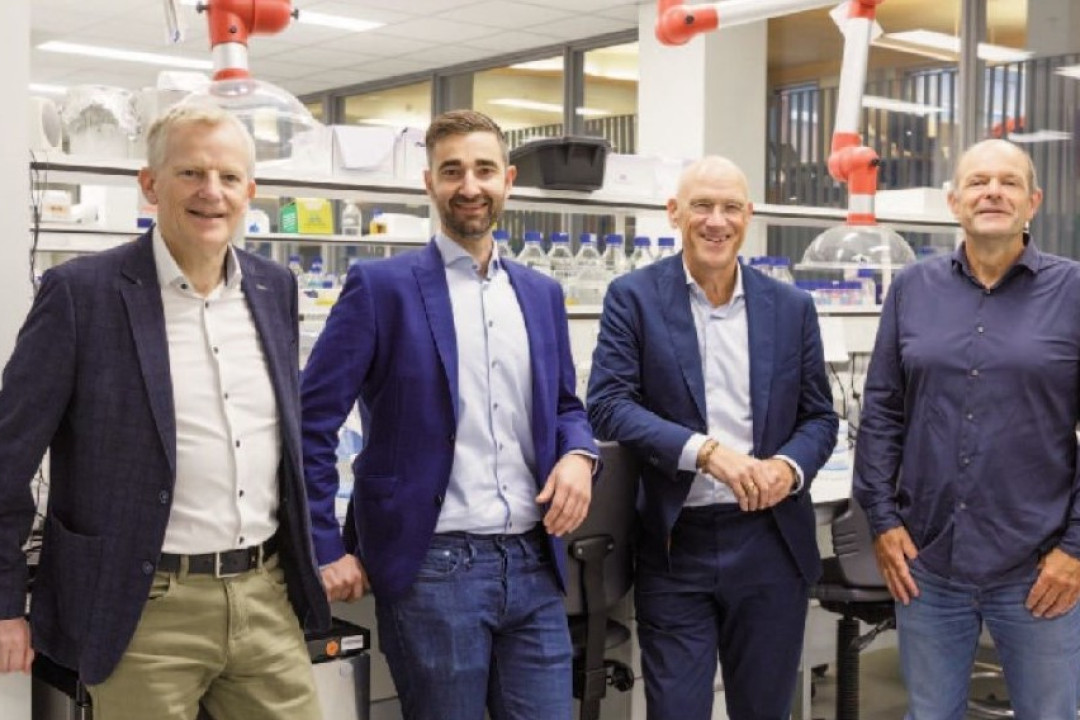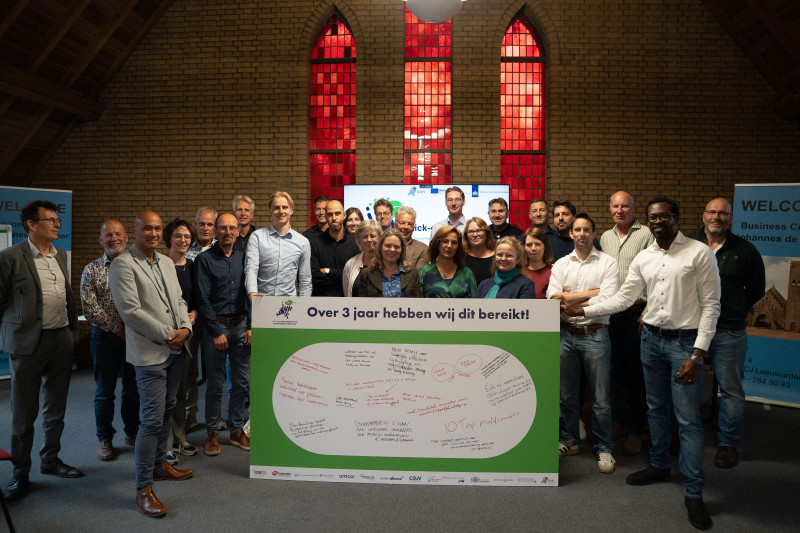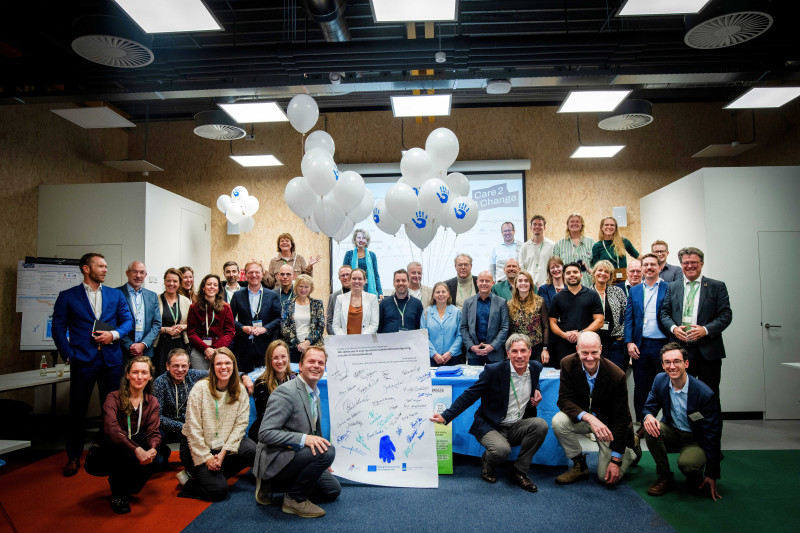In September, NoordZ magazine published a wonderful article about the 10th anniversary of the LIFE Cooperative, in which we share our growth, collaborations, and future plans. The article highlights how LIFE brings companies together and fosters innovation in the Life Sciences & Health sector. Read the full article below (in Dutch)!
It has already been ten years since LIFE Cooperative was established. The goal then, as now, was to unite Northern companies active in the Life Science & Health (LSH) sector and leverage the benefits of collaboration. These include attracting and building funds, education, investments, facilities, and projects that would be out of reach for individual parties, while fostering cross-pollination where possible. LIFE Cooperative serves as a central hub, aiming to drive growth in the sector.
As of 2024, 65 companies are affiliated with LIFE Cooperative, providing employment to more than 4,500 FTEs. “And we’re far from done growing; on the contrary,” says director Peter Ketelaar. The sector is experiencing significant growth. “We aim to grow at an above-average rate compared to the economy. So far, we’ve succeeded, achieving an average growth of 7 percent over the past ten years.” He anticipates that the number of affiliated companies will grow to 90 within the next five years, with 7,500 people working in these companies. “The sector generates around 350 vacancies annually, meaning that continuous education and training are essential. This must be done in coordination with educational institutions to ensure that the right programs are offered, aligning well with the needs of the business community.”

“It would not be feasible for each company to handle that individually,” adds Head of Business Development Ronald Hesse. “LIFE Cooperative can play a crucial role here, just as we do in supporting start-ups. Many ideas originate from UMCG and the University of Groningen, which companies then develop further. There is a lot of risk involved, particularly in terms of financing. LIFE Cooperative focuses on securing solid funding and providing guidance by setting up or attracting these funds, allowing these companies to move forward.”
“In addition, we connect start-ups with experts,” Peter Ketelaar continues. “For example, they help with drafting a solid business plan. We facilitate, provide financial resources, and offer expertise. Furthermore, we aim to exchange and connect knowledge wherever possible.”
The ultimate goal is to make the right expertise available to every company affiliated with LIFE Cooperative. It is essential to navigate regulations, financing, and subsidies. We can deliver this because of our strong network on and around Campus Groningen. Not all investments yield immediate returns, but they are necessary to remain competitive. In the Northern Netherlands, we excel in competition, particularly in drug research and development, where we are a leading player in Europe.”
One recurring theme in life sciences is the need to anticipate. “Call it innovative cutting-edge technologies,” says Ronald Hesse. “The first project we started three years ago is now coming to fruition. This means we have also tailored educational programs to align with it. It is a deep investment that allows you to stay ahead of future developments. Thanks to the solid foundation we have built in the Northern Netherlands, we are now receiving tens of millions of euros in subsidies to support various advancements.”
Ronald Hesse refers to these as untapped diamonds, which will take shape in the coming years. “Take, for example, drug delivery, where medicines are delivered precisely where they are needed. The same applies to the new genetic lab we are setting up. LIFE Cooperative is constantly in discussion with companies and knowledge centers to establish consortia, develop business plans for potentially unprofitable peaks, and secure subsidies. This helps mitigate the risks associated with often substantial investments. Moreover, it allows us to maintain the competitive edge of the Northern Netherlands' life sciences and health sector. This regional sector is uniquely positioned to make a significant leap toward a new economy.”
LIFE Cooperative is also keenly observing the Nij Begun initiatives and the positive impact they are expected to have on the development of the Northern Netherlands, particularly in the areas of economy, healthcare, culture, and education. Peter Ketelaar explains, “In this context, societal ambitions can align with the entrepreneurial goals of the Life Science sector. Nij Begun can create the conditions that allow us to realize our ambitions.”
Meanwhile, preparations for celebrating the 10th anniversary are in full swing. This will include a conference and a farewell to two pioneers who have been part of the LIFE Cooperative board since its inception: Ton Vries and Johannes Wolters. “They have a strong commitment to the North,” says Peter Ketelaar. “Over the past ten years, they have achieved a great deal for the sector. This is a sector full of opportunities, where one can work from cradle to retirement. Look around you; the Northern Netherlands offers plenty of possibilities for a rewarding career in Life Science & Health, and LIFE Cooperative is happy to contribute to that.”
Download the full article here.
Source of image and text: NoordZ. Image from left to right: Johannes Wolters, Ronald Hesse, Peter Ketelaar, and Ton Vries.

A unique collaboration for an urgent problem Pharmaceutical residues in groundwater and surface water pose a growing problem. Due to population ageing and the rise in chronic conditions, medication use is expected to increase significantly in the coming years. This creates an increasing threat to environmental and human health, particularly in Northern Netherlands as one of the most rapidly ageing regions. What makes this project unique is that parties from the water technology sector, the Life Science & Health sector, and the healthcare sector jointly work with SMEs to develop innovative solutions. Under the leadership of lead partner TCNN, these domains are brought together, resulting in a powerful acceleration of both knowledge development and the actual implementation of innovative solutions.Project objectives Under the guidance of work package leaders Water Alliance, LIFE Cooperative, CEW, and UMCG, the partners focus on elaborating existing problem areas. For each problem area, SMEs will be sought that can provide solutions across four interconnected pillars: • Advanced water treatment: development and application of new technologies to effectively remove pharmaceutical residues from water. • More sustainable medicines and administration: innovation in pharmaceutical products and delivery methods that reduce environmental impact. • Improved prescribing behaviour and medication adherence: awareness-raising and training to prevent unnecessary medication use. • Active knowledge sharing: intensive collaboration, communication, and dissemination of best practices within the region and beyond.Impact after three years During the kick-off, participants emphasised the shared ambitions they aim to achieve: • A structural connection between the water, pharmaceutical, and healthcare sectors• Measurable reduction in medication use through more conscious prescribing• Sustainability as an integral and self-evident part of medication use and policy In addition to these societal benefits, the project aims to create 75 new jobs and to provide targeted support to at least 30 companies. The developed solutions can also be applied nationally and internationally. This integrated approach positions Northern Netherlands as a national and international frontrunner in tackling pharmaceutical residues in water.Partners The project is a collaboration between: TCNN (lead partner), LIFE Cooperative, Wilhelmina Ziekenhuis Assen, Martini Ziekenhuis, Isala Ziekenhuis, University of Groningen, UMCG, Frisius MC, Water Alliance, Centre of Expertise Watertechnology (CEW), Wetterskip Fryslân, Waterschap Noorderzijlvest, Province of Groningen, Province of Drenthe, Province of Fryslân, SNN, and Medicijnresten uit Water Noord-Nederland. Together, we are building a healthy, sustainable, and economically strong Northern Netherlands.

With the launch of LIFE Capital, the Northern Netherlands gains a powerful collaboration platform that brings together companies, talent, and knowledge institutions in the fast-growing Life Sciences & Health sector. During a special launch dinner on Tuesday, November 25 at LIFE Cooperative member Polyvation on the Groningen Campus, not only was the new brand unveiled, but an ambitious vision for the future was also presented. LIFE Capital, formerly LIFE Academy, marks the next phase of the LIFE Cooperative: shifting from a focus on training alone to a broadly supported collaboration platform for human capital. “With LIFE Capital we are taking the next step in strengthening our sector,” says Melloney Dröge, board member of the LIFE Cooperative. “We are bringing companies, talent, and knowledge together into one ecosystem where growth, learning, and innovation go hand in hand. We are aiming for a joint approach to the human capital challenges of our sector. In this way, we are building a region where you can truly move forward for a lifetime, literally and figuratively.”From LIFE Academy to LIFE Capital The transition from LIFE Academy to LIFE Capital is more than a name change. The new brand reflects the organization’s growth and its ambition to look beyond training alone. LIFE Capital will become the linchpin of human capital in the Life Sciences & Health sector: it connects talent, companies, and knowledge, accelerates collaboration, and strengthens the position of the Northern Netherlands as a breeding ground for innovation and talent. A long and healthy life: that is ultimately what Life Sciences & Health is all about. Thanks to innovations from companies in this sector, diseases are detected sooner, treated more effectively, and sometimes even prevented. From breakthrough therapies to keeping healthcare affordable and accessible, the business community acts as the engine behind life-changing progress. LIFE Capital aims to strengthen that foundation by investing in people, knowledge, and collaboration. “LIFE Capital helps companies move forward, but also strengthens the image and visibility of our sector,” says Sven Stielstra, Manager of LIFE Capital. “In this way, we show what Life Sciences & Health truly stands for and make the sector attractive to new talent and innovative companies. Over the next ten years, we will attract €50 million for human capital. In this first year alone, we have already realized €6.6 million through regional and national funds.”Looking ahead: recruitment campaign and pilots in 2026 Today, the day after the launch dinner, LIFE Capital’s recruitment campaign begins. This campaign focuses on attracting participants for the first pilot modules, which will start in spring 2026. These modules were developed thanks to an intensive and unique collaboration between Hanze, UMCG, and various companies within the sector. By combining knowledge and practical experience, top-notch programmes have been created that will be tested in the coming period. After the pilot phase, the modules will be further developed and made more widely available later in 2026 to everyone in the Northern Netherlands who wishes to contribute to a strong Life Sciences & Health ecosystem.About LIFE Capital LIFE Capital is the collaboration platform of the LIFE Cooperative, a network of more than 60 companies in the Life Sciences & Health sector. The platform connects organisations around shared human capital challenges and develops solutions that attract, develop, and retain talent. What started ten years ago as separate initiatives within the cooperative has grown into a strategic programme in which companies, knowledge institutions, and governments work together on a structural basis. With activities ranging from joint training and HR networks to new educational programmes and labour market research, LIFE Capital works towards one goal: a strong, agile region in which talent in life sciences & health can continue to grow with the right skills. Move people forward.About LIFE Cooperative The LIFE Cooperative stimulates innovation in the life sciences by facilitating collaboration between entrepreneurs, researchers, and investors. Through various programmes and events, LIFE promotes the development of technologies that improve health and well-being. The cooperative represents more than 60 companies in the Northern Netherlands, ranging from ambitious startups and innovative SMEs to international players. Together, they represent approximately 5,000 FTEs and a turnover of €500 million.

Accelerating Sustainability in Healthcare Paulina Snijders, member of the UMCG Executive Board, and Bart Volkers, director of the Circular Groningen Drenthe Association (VCGD), opened the executive network meeting. They emphasized the importance of cooperation between all partners. Artist Maria Koijck delivered an inspiring keynote on visualizing hospital waste. UMCG Chief Green Officer Schelto Kruijff outlined opportunities to accelerate sustainability in healthcare, sharing inspiring examples such as the use of a washable, reusable insulation gown. Project leaders Sven Jurgens and Femke van der Zant described how the consortium has significantly developed in recent times.Various Work Packages The executives exchanged extensive experience and knowledge, and the Care2Change work package leaders presented posters. The work packages focus on areas such as redesigning single-use healthcare products and mapping the CO₂ emissions of products. Sven Jurgens said: “Care2Change is the starting point for continued collaboration on making healthcare more sustainable. How valuable it would be if, through this collaboration, we could provide a blueprint for others to inspire them to go green as well.”Northern Netherlands as an Example Hanneke Bouwsema, secretary to the special government representative for the circular economy at the Ministry of Infrastructure and Water Management, emphasized the importance of starting small and recognizing the sustainable initiatives that are already working well. She described the Northern Netherlands as a “role model” for The Hague when it comes to making healthcare more sustainable.About the Care2Change Consortium Care2Change is a collaboration between UMCG, University of Groningen, Martini Hospital, Sterinoord, GS1/EAN Netherlands, Boikon, Ommelander Hospital, Treant, Frisius MC, NHL Stenden, Hanze University of Applied Sciences, Circular Friesland Association, LIFE Cooperative, Circular Groningen Drenthe Association, Green Chemistry Drenthe Business Network (SUSPACC), Milieuplatform Zorg, Nij Smellinghe, Pezy Product Design, 8D Games, House of Design, Antonius Hospital, NOM, Menzis, De Friesland, Ecoras, BBENG, the provinces of Groningen and Drenthe, and the municipalities of Groningen, Assen, Leeuwarden and Emmen. The project is partly funded by SNN’s ERDF resources, with co-financing from the participating organizations.More Information Want to know more about Care2Change and the consortium? Read: UMCG trots op nieuwe samenwerking die uitstoot terugdringt: Care2change Source article: Care2Change